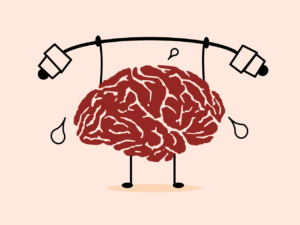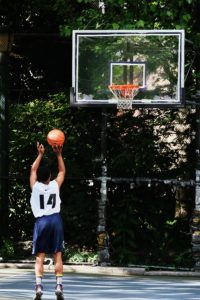By Darleen Barnard, DHA, CPT, CHC, special to SportsMD.com
When looking for ways to improve sports performance, the obvious approaches include physical conditioning and practice. Yet we also hear about athletes who tap into the power of their mind to further refine their skills to give them that competitive edge. Is there any truth to this?
Could mindset also contribute to improved sports performance? The answer is “YES”! Countless studies support the power of the mind on sports performance, specifically visualization and mental toughness. If you are currently recovering from an injury, this is a great approach to help you stay in the game while you are sidelined!
Visualization

Visualization, or mental imagery, is one mindset trick that has the power to improve performance. Arnold Schwarzenegger, Lindsey Vonn, Michael Jordan, and Michael Phelps are just a few elite athletes who openly discuss their practice of using visualization. Researchers and sports psychologists concur that the power of visualization has the potential to move the needle for all athletes.
A famous study was conducted by Alan Richardson in the 1960’s on the power of visualization on basketball free-throws. Study participants were divided into 3 groups.
Group 1: physically practiced free throws for 30 days
Group 2: mentally visualized successful free throws for 30 days
Group 3: did not practice and did not visualize
At the end of the 30 days, as expected, the group that did not practice or visualize did not show any improvement. The group that physically practiced every day showed a 24% improvement. And even more exciting, the group that mentally visualized successful free throws improved by 23%! Mental visualization was almost as effective as physical practice!
How to Use Visualization to Improve Sports Performance
- Use all of your senses to visualize. Richardson found in his studies that visualization was even more effective when combined with other senses. When you also “feel” the ball in your hand and “hear” the sound of the ball swooshing through the net as you “see” the ball go through the hoop, the effects are magnified.
- Visualize proper form and technique. Richardson further states that visualizing needs to be vivid, controlled, and of correct form. Stay laser focused on proper form and technique while you are visualizing.
- Don’t forget to practice. Later studies confirmed that the combination of both mental visualization and physical practice showed the greatest improvement, so don’t cut back on your physical training!
- Consider working with an expert. Coaches who are trained in Neuro Linguistic Programming (NLP) or Sports Psychologists trained in visualization techniques will be able to help you get the most out of visualization exercises.
Mental Toughness
 In addition to visualization, mental toughness is another important aspect of mindset that cannot be ignored. You may have heard various quotes and statistics such as “Running (or exercise) is 90% mental.” Depending on the source, the stat can vary anywhere from 80% to 99%. Regardless of who you ask, there is no doubt that mental toughness plays a role in sports performance. Being able to mentally push beyond the physical discomfort is another way that elite athletes are able to beat the competition.
In addition to visualization, mental toughness is another important aspect of mindset that cannot be ignored. You may have heard various quotes and statistics such as “Running (or exercise) is 90% mental.” Depending on the source, the stat can vary anywhere from 80% to 99%. Regardless of who you ask, there is no doubt that mental toughness plays a role in sports performance. Being able to mentally push beyond the physical discomfort is another way that elite athletes are able to beat the competition.
Angela Duckworth, a researcher at the University of Pennsylvania, has studied mental toughness for years. She has concluded that it is mental toughness, as opposed to strength (or grades or intelligence in other studies), that determines success.
One of her most famous studies looked at cadets at West Point to determine what was most likely to lead to their success. She found that those cadets who scored one standard deviation higher on the “grit scale” were 60% more likely to finish above their fellow cadets.
Similar to the studies on visualization, mental toughness has the ability to give athletes a competitive edge when combined with physical training.
How to Build Mental Toughness to Improve Sports Performance
-

Unsplash/Malcolm Lightbody Define what mental toughness means for you. If you are a runner, what does it mean to be mentally tough? Does it mean you need to push through miles 18-26 of a marathon when you hit the wall? What exactly will mental toughness do for you?
- Practice and create small wins. Just like you build physical strength, you must practice to build your mental strength. Similar to visualizing, this needs to be done in conjunction with a physical training program! Push the boundaries and practice pushing through the discomfort in smaller doses when training. The more you do this, the more you will increase not only your physical stamina, but also your confidence, which increases your mental toughness.
- Train with other athletes and/or work with a coach. Working with others will push you harder and farther than you can go alone! Challenge yourself and push yourself out of your comfort zone with group support and a trained expert.
Mindset and the power of the mind is getting a lot of attention these days! Visualization and mental toughness are only two techniques that athletes can use. Whatever method you decide to use, never underestimate the power of your mind to take your sports performance to the next level.
References:
Duckworth, A., Peterson, C., Matthews, M., Kelly, D. (2007). Grit: Perseverance and Passion for Long-Term Goals. Journal of Personality and Social Psychology,92(6).
Richardson, A. (1967). Mental Practice: A Review & Discussion Parts 1 & 2. Research Quarterly, 38(1).
About the Author: Darleen Barnard is a Certified Personal Trainer, Health Coach, NLP Practitioner, and Hypnotist who specializes in weight loss and behavior change. She is the owner of Fit4Health, a Holistic Health Coaching company that uses the power of the mind to help people lose weight and keep it off for good.


